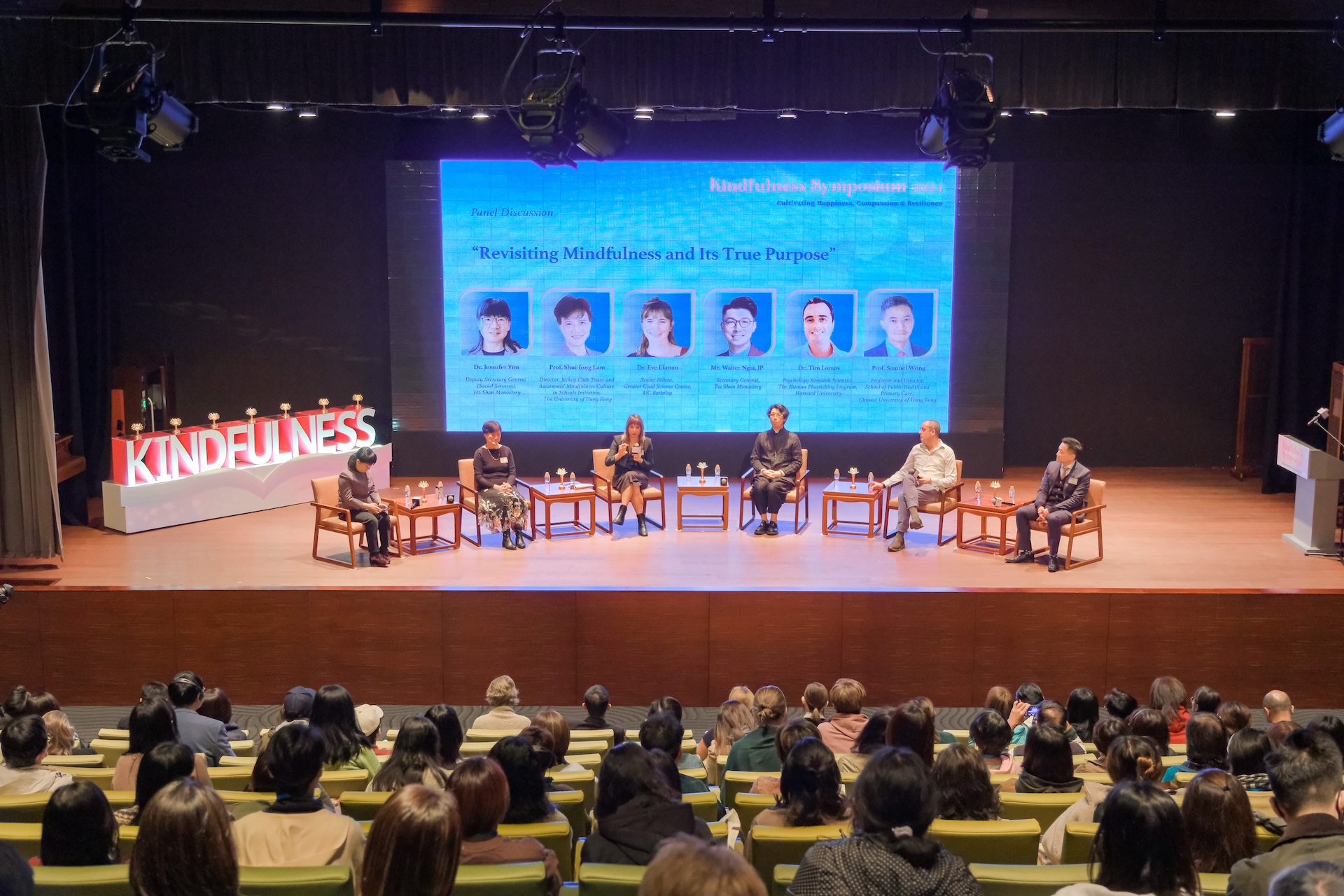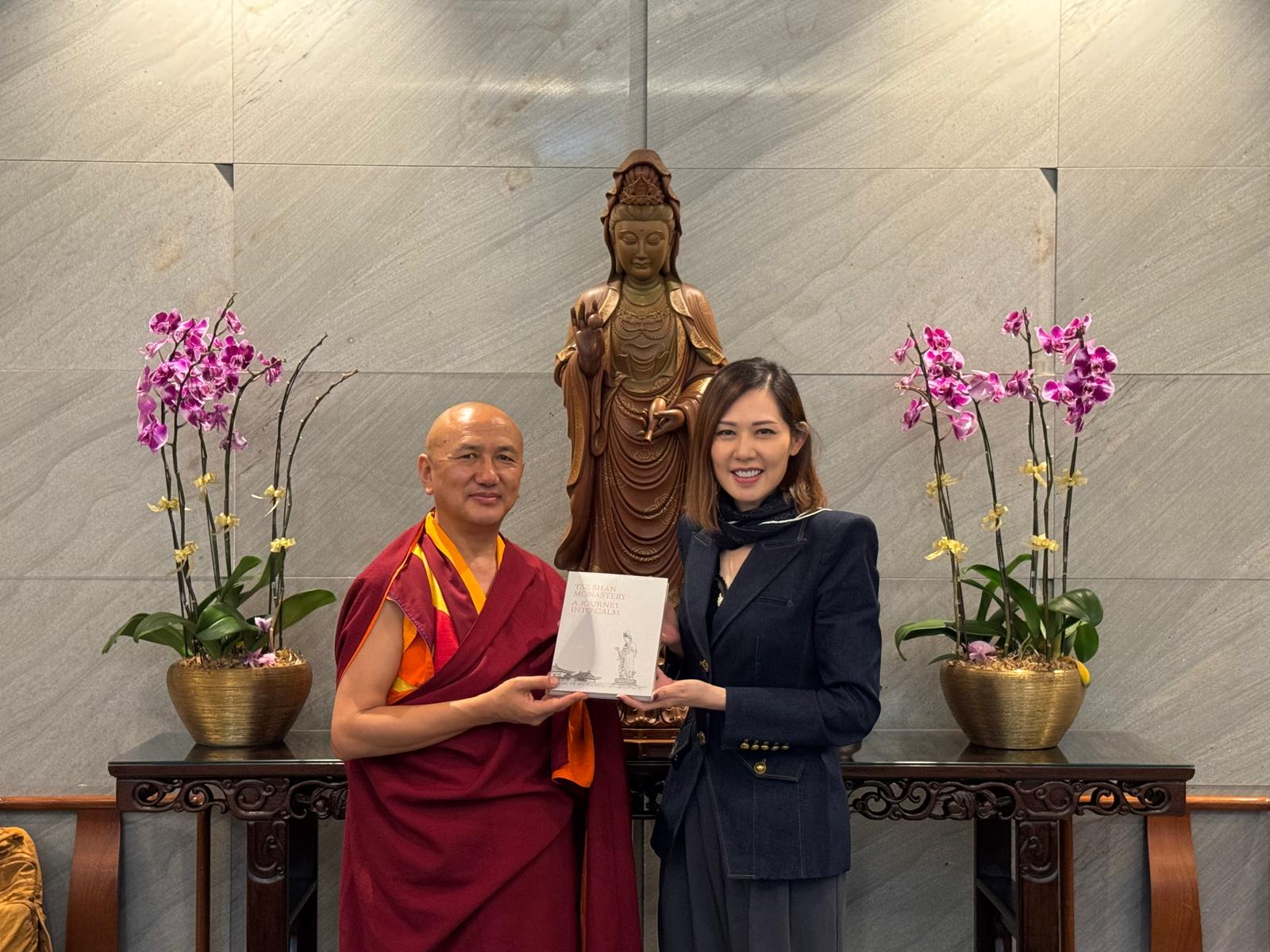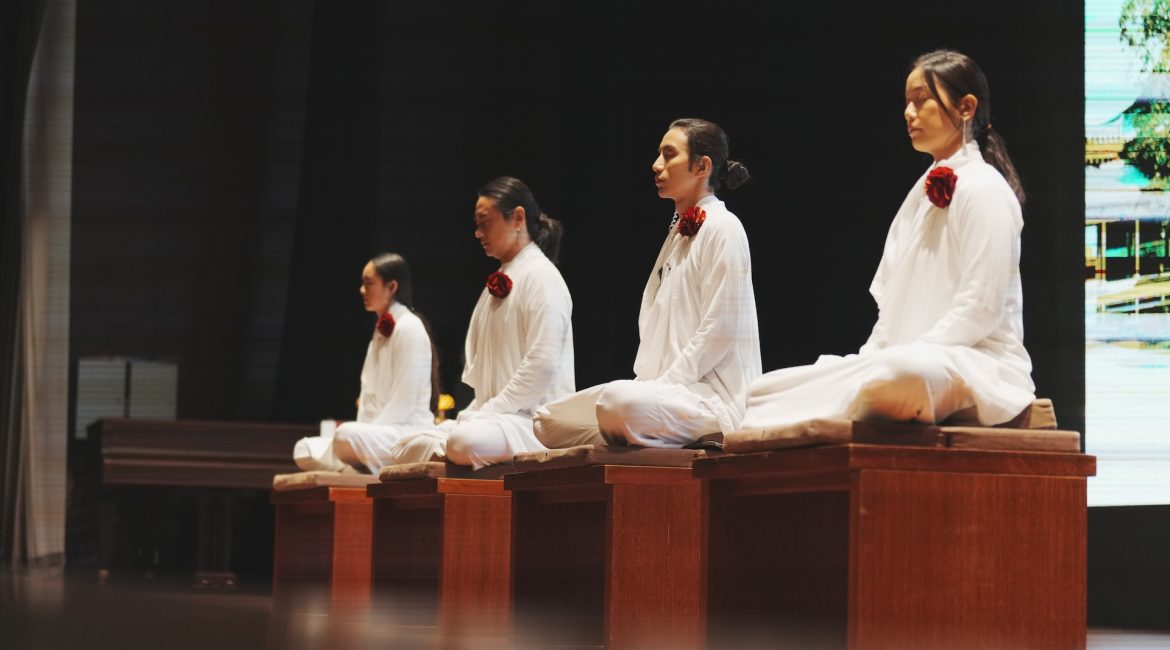I had visited the always awe-inspiring Tsz Shan Monastery (TSM) earlier in October, when I took my guru, H.E. Ven. Sangay Dorji, to visit TSM. The chairman of Bhutan’s Central Monastic Body was accordingly welcomed by deputy secretary general Ms. Olivia Low, who exchanged with His Eminence ideas about running monastery operations with vision and innovation. One strategy that TSM has been famous for since its formal opening in April 2015 is serving as a hub for international exchanges on cutting-edge Buddhist developments. The most recent of these was the Kindfulness Symposium 2024: Cultivating Happiness, Compassion & Resilience, which was co-organized by Tsz Shan Institute (the monastery’s research and learning division) and the Hong Kong Psychological Society.
The event ran from 7–8 December, with nearly a thousand people attending both in person at TSM and online. While I was unable to be one of them, due to my being run over by a cab a few days earlier, I had been very keen to learn about the newest updates on kindfulness research. TSM and its supporting organization, the Li Ka Shing Foundation, has had a long collaborative history with the Greater Good Science Center (GCSC) at UC Berkeley. One of their leading experts, Dr. Emiliana Simon-Thomas, gave a keynote presentation on Day One about, “The Architecture of Compassion: A Blueprint for a Flourishing World.” Dr. Simon-Thomas brought with her the research by the GCSC and new scientific insights to offer a comprehensive outline for implementing true and effective compassion throughout contemporary society.

In his keynote talk, Prof. Willem Kuyken of Oxford offered an update about “‘A Life Well Lived’: From Preventing Depression to Promoting Human Flourishing: Mindfulness-based Cognitive Therapy Comes of Age.” I found this subject to be of particular importance at the macro scale, due to MBCT and MBSR having shaped Western Buddhism and Western Buddhist culture so irrevocably. Prof. Kuyken’s lecture was important in providing a broad analysis of how MBCT is no longer focused only on the wellbeing of the individual (as much as Buddhism stresses that outer transformation must begin with inner practice), but is focused on how humanity may collectively improve and heal its collective consciousness.
Other keynotes included: “Interface between mindfulness, sensory processing and mood disorders” (Prof. Zindel V. Segal), “Towards a Epidemiology of Systemic Kindness: Ripples of Micro-kindnesses as Communal Love in Action” (Dr. Tim Lomas), “From anxiety to addiction: how to leverage curiosity for habit change” (Prof. Judson A. Brewer), “Compassion and Mindfulness: can we cultivate compassion through mindfulness training?” (Prof. Samuel Wong), “Building Resilience Through Empathy: Tackling Burnout in the Modern Workplace” (Dr. Eve Ekman), and “Nurturing school communities with mindfulness” (Prof. Shui-fong Lam).

Other experts from a range of respected institutions, including The University of Hong Kong (HKU) and other Hong Kong-based universities, Harvard, and Brown, participated in sharing their insights on topical matters that bridge Buddhist philosophy with the most urgent matters in our daily lives, including work burnout, compassion and mindfulness, and emotional problems and psychological disorders. “In the afternoons, interactive workshops prioritized a harmonious blend of theoretical understanding and practical application, inspiring participants to engage deeply in dialogue and collaborative practice,” stated TSM in a press release.
“Reflecting the symposium’s theme, activities such as sound healing, forest therapy, a Buddhist art museum tour, and the Ten Great Vows’ pilgrimage stamp tour offered attendees meaningful opportunities to contemplate Kindfulness underneath the statue of Guanyin, seeking tranquility and ease.” In the seminars and roundtable discussions following the presentations, guest speakers, TSM volunteers, and audience members shared their experiences and lessons on mindfulness training in a hectic world, community building amidst alienation and compartmentalizing social media, and habit formation in the face of endless stimuli and unproductive distractions.
Kindfulness is “the essence of kindness and mindfulness.” While it has now entered the lexicon of most mindfulness institutes and teachers, kindfulness was originally popularized by Theravada teacher Ajahn Brahm. As I have written before, kindfulness is simply the principle that that developing mindfulness should be accompanied by a friendly and forgiving attitude to oneself and others. True happiness and liberation is not simply meditation and cultivating awareness of how things are, but looking to heal where the heart has been hurt and being aware in a way that is warm, approachable, and tender. Most importantly, kindfulness is a practice to be turned inward, much like mindfulness, except with self-compassion being generated as one directs love and forgiveness to one’s own self.

It is not often that an international conference can generate a “kindful” atmosphere on the premises and uplift the entire attending group, presenters and audiences included. In a world fraught with tension and volatility, it is critical that socially responsible institutions, from research centers to monasteries to university departments, unite to take kindfulness global, injecting this inner work into as many outlets of human activity as possible. . . including politics, statecraft, and diplomacy. From there, the work of peacemaking can envelop the current febrile global setting, setting the entire world into a new orbit as a “wheel” of Dharma.
Related news from BDG
Theravada Teacher Ajahn Brahm Teaching in Hong Kong in March
Related features from BDG
Tsz Shan Monastery and Greater Good: Spiritual Care in Turbulent Times

